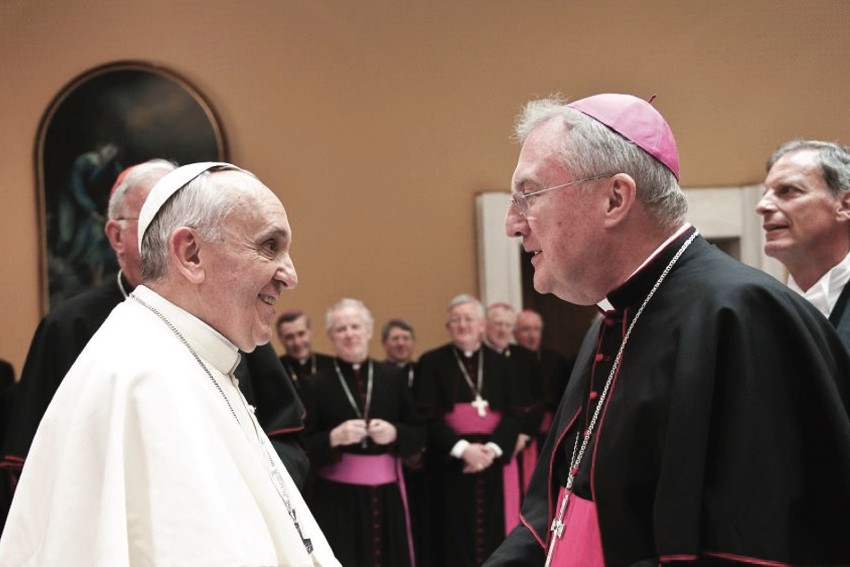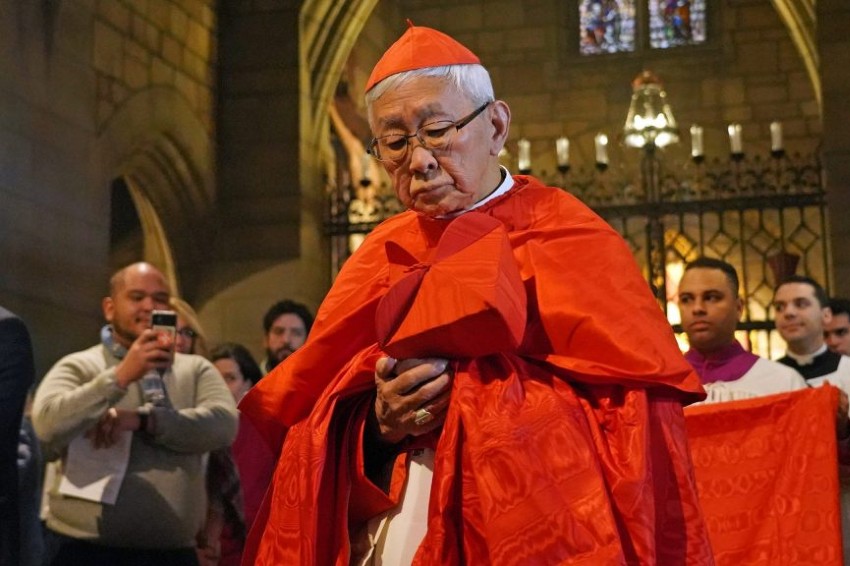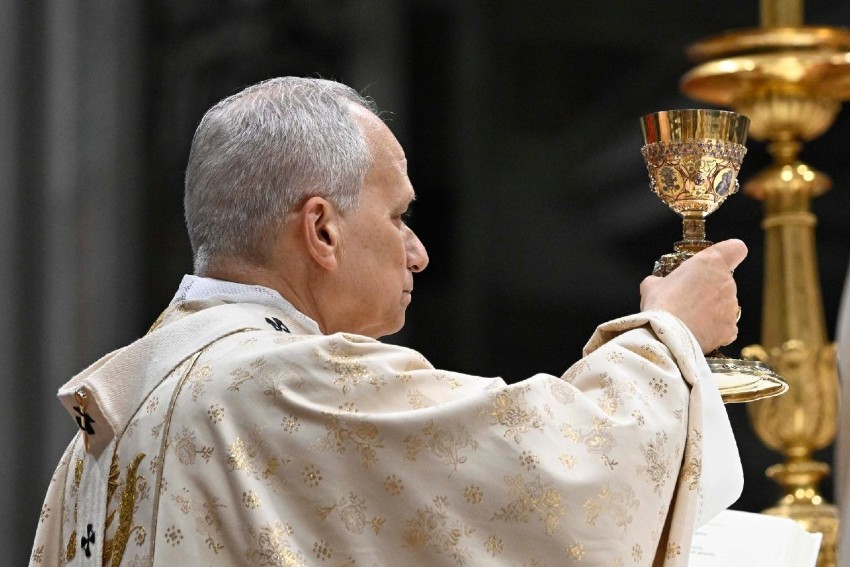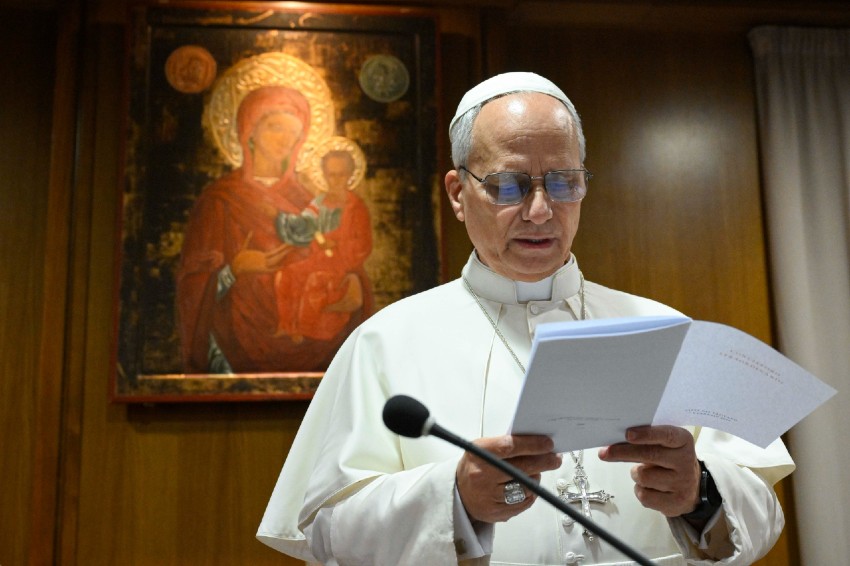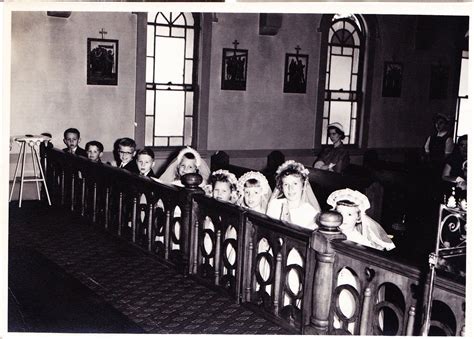
Above, Catholic children make their first communion sometime in the 1950s during a celebration of Mass according to the old Latin rite, called the “old Mass,” or the “Tridentine Mass,” or the “extraordinary form of the Mass,” which at that time was the ordinary Mass for all Catholics
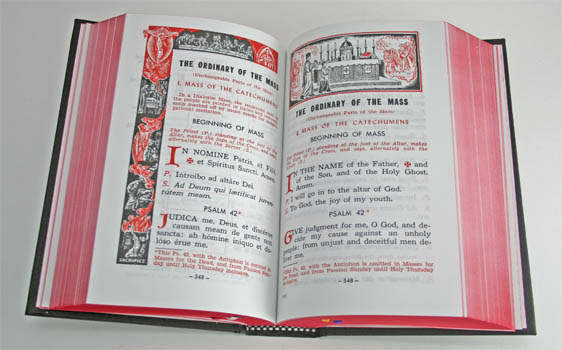
The first pages of the missal of the old Mass, with Latin on the left, English translation on the right.
Letter #46, Sunday, July 4, 2021: A new appeal to Pope Francis concerning the Old Mass
Responding to seemingly well-founded rumors that Pope Francis may soon issue a restrictive revision of Pope Benedict‘s motu proprio Summorum Pontificum of July 7, 2007 — in which Benedict allowed greater freedom to the celebration of the old Latin Mass throughout the Catholic Church — an international Catholic group called “Una Voce” (“with one voice”) today issued an appeal to the Pope not to restrict the celebration of the old Mass. (link)
The appeal (picture of the text in Italian below, as well as the full text in English) came in the form of a Sunday, July 4 advertisement/open letter in one of Italy’s leading daily newspapers, La Repubblica, which prints more than 150,000 copies each day (link).
The essential point of this appeal is contained in this sentence:
“The growth of interest in the traditional liturgy is not due to nostalgia for a time we do not remember, or a desire for rigidity: it is rather a matter of opening ourselves to the value of something that for most of us is new, and inspires hope.”
So the appeal asks Francis not to restrict the use of the old liturgy.
Francis, adoration of God, and the old liturgy
Today’s appeal notes that Pope Francis himself “has characterised the ancient liturgy in terms of a ‘sense of adoration’ (Press conference of 28 July 2013).”
So it seems important to go back and look at this press conference, to understand the mind of Francis.
Here is the question and answer from that 2013 press conference of Pope Francis on the airplane coming back from World Youth Day in Brazil that July (Press conference of 28 July 2013):
Alexey Bukalov (asking Francis a question on July 28, 2013):
Good evening, Holy Father. Holy Father, returning to ecumenism: today, the Orthodox are celebrating one thousand and twenty-five years of Christianity, and there are great festivities in many capital cities. If you would comment on this, I would be grateful. Thank you.
Pope Francis: In the Orthodox Churches, they have retained that pristine liturgy, which is so beautiful. We have lost some of the sense of adoration. The Orthodox preserved it; they praise God, they adore God, they sing, time does not matter. God is at the centre, and I would like to say, as you ask me this question, that this is a richness. Once, speaking of the Western Church, of Western Europe, especially the older Church, they said this phrase to me: Lux ex oriente, ex occidente luxus. [“Light from the East, from the West, luxury”] Consumerism, comfort, they have done such harm. Instead, you retain this beauty of God in the centre, the reference point. When reading Dostoevsky – I believe that for all of us he is an author that we must read and reread due to his wisdom – one senses what the Russian soul is, what the eastern soul is. It is something that does us much good. We need this renewal, this fresh air from the East, this light from the East. John Paul II wrote about this in his Letter. But many times the luxus of the West makes us lose this horizon. I don’t know, but these are the thoughts that come to me. Thank you.
***
So what do we have here?
Francis here says the Orthodox have “retained that pristine liturgy, which is so beautiful.”
And he adds: “We have lost some of the sense of adoration. The Orthodox preserved it; they praise God, they adore God, they sing, time does not matter. God is at the centre…”
And he also adds: “Once, speaking of the Western Church, of Western Europe, especially the older Church, they said this phrase to me: Lux ex oriente, ex occidente luxus. [“Light from the East, from the West, luxury”]Consumerism, comfort, they have done such harm. Instead, you [he means “you Orthodox”] retain this beauty of God in the centre…”
And he also says: “We need this renewal, this fresh air from the East, this light from the East.”
Here we find in the words of Francis himself something very similar to the longing expressed by the traditional Catholics who love the austere solemnity, the mysticism, the holiness, of the old Catholic liturgy.
In appealing to Pope Francis not to cut off access to the old liturgy, they are appealing to this aspect of Pope Francis’ own thought.
Therefore, the appeal argues, Catholics may apply Francis’ words to their wish to be free to celebrate the Mass in the old way — not as something archeological or out of a museum, but as part of a “living history that welcomes us and pushes us forward” (Evangelii Gaudium 13).
***
In other words, the authors of this appeal, who are admittedly lovers of the old Catholic liturgy, are attempting to set their love of the liturgy in a timeless context, as a result of the innate human desire for the holy, for the transcendent, and not in any way in a context of cultural or political “restorationism.”
No.
In a mystical context, not in a monarchical — or any other socio-political — context.
***
Clearly, this is an attempt to change the terms of the debate, terms which have been unfairly forced upon “traditionalists” by many of their “modernist” critics.
Catholics who love tradition, especially in the liturgical realm, do not love tradition in the way the modernists claim they do, Una Voce is saying.
No, they do not love the old Mass out of a kind of “sclerotic, fearful grasping for the stuffy securities of the past” in a time of change, but rather because, in this very time, in the 2020s, the old ways and old words of the traditional liturgy have somehow begun to seem “newer” than the words of the 1960s.
This is a critical point.
In fact, it is the decisive point.
What this appeal is really saying is that the old Mass, in its venerable antiquity, rooted in prayers and hymns from the very first centuries of the Church, actually seems “newer,” “fresher,” “more alive” than many of the prayers of the “new Mass,” which, 50 or 60 years later, because rooted in the trendy, time-bound certainties of that age, is starting to seem “old.”
***
And, in fact, in this way, it is precisely in keeping with the oft-repeated words of Pope Francis himself, with what he wants the Christian faith and the Christian life to be for all people: something fresh and alive and unpredictable and filled with love for God and neighbor, not something small and narrow and rigid and ideological.
The Catholic Church, the bride of Christ, is ever ancient, ever new.
She is not the product of one decade of excitement and enthusiasm from the mid-20th century. —RM
Points Concerning the Old “Tridentine” Mass
Ancient missals show that the Latin Mass Canon remained essentially the same from very early, at least from the time of Pope Gregory the Great (560-604), who also promoted Gregorian chant, which took his name. That amounts to almost 1,500 years.
This “old Mass” was codified at the end of the Council of Trent (1545-1563) by Pope Pius V (1504-1572) in 1570 — now nearly 500 years ago — and so became known as “the Tridentine Mass” due to its connection with Trent (“Trent” in Latin is “Tridentum,” link).
The old Latin or Tridentine Mass has never been abrogated, but it was set to one side by Pope Paul VI in 1970, who replaced it with the “Novus Ordo” (“new order”) Mass in that year, and this “Mass of Paul VI” has now become the the “ordinary Mass” for the entire Church, while the old Mass has come to be called the “extraordinary form” of the Mass.
Because the old Mass was celebrated for so many (many) centuries, it seems to me (and I find this view expressed in many of the writing of Pope Benedict XVI) that Catholics ought never to regard the celebration of the old Mass as in any way theologically wrong or improper, but rather should always look on the old liturgy as good, as venerable, as holy, as worthy of profound respect.
Hence the sadness of many Catholics at the attitude which seeks to denigrate and repress the celebration of the venerable and holy old Mass.
And hence the concern about the rumors concerning an imminent restriction in the freedom granted to Catholic priests to celebrate Mass according to this holy and venerable liturgy. —RM
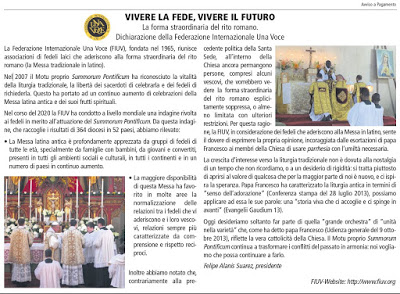
Here is the complete text of today’s Una Voce appeal:
Statement from Una Voce International on Summorum Pontificum (link)
In recent months there have been many rumours about the status of Summorum Pontificum in the Church.
The work of the International Federation Una Voce in collaboration with the proper eccelesial authorities led to Pope Benedict’s document [in 2007] which opened up the Extraordinary Form of the Mass for the whole Church.
Continuing in our role of representing the faithful attached to the Usus Antiquior [the Latin means “the more ancient use” or “the more ancient rite”] to the hierarchy, FIUV have produced the following statement in response to the rumours that have been circulating.
Living the faith, living the future:
The Extraordinary Form of the Roman Rite
Declaration of the International Federation Una Voce
The International Federation Una Voce (FIUV), founded in 1965, brings together associations of the lay faithful attached to the Extraordinary Form of the Roman rite (the Traditional Latin Mass).
In 2007, the Apostolic Letter Summorum Pontificum recognised the vitality of the traditional liturgy, the freedom of priests to celebrate it, and of the faithful to request it. This has led to an ongoing increase in the number of celebrations of the ancient Latin Mass, and of its spiritual fruits.
During 2020 the FIUV conducted a worldwide survey of the faithful on the implementation of Summorum Pontificum.
From this survey, which included results from 364 dioceses in 52 countries, we found:
• The ancient Latin Mass is deeply appreciated by groups of faithful of all ages, especially families with children, young people and converts, found in all social and cultural environments, on all continents and in an ever increasing number of countries.
• In many areas the increased availability of this Mass has favoured the normalisation of relations between the faithful attached to it and their bishops, relations increasingly characterised by mutual understanding and respect.
Nevertheless, we have noticed that, contrary to the previous policy of the Holy See, there are still people within the Church, including some bishops, who would like to see the Extraordinary Form of the Roman rite explicitly suppressed, or subject to further restrictions.
For this reason, the FIUV, in view of the faithful who adhere to the Latin Mass, feels the duty to express its opinion, encouraged by Pope Francis’ exhortations to the members of the Church to use parrhesia with the necessary humility.
The growth of interest in the traditional liturgy is not due to nostalgia for a time we do not remember, or a desire for rigidity: it is rather a matter of opening ourselves to the value of something that for most of us is new, and inspires hope.
Pope Francis has characterised the ancient liturgy in terms of a “sense of adoration” (Press conference of 28 July 2013), we can also apply his words to it: a “living history that welcomes us and pushes us forward” (Evangelii Gaudium 13).
Today we only wish to be part of that “great orchestra” of “unity in variety” which, as Pope Francis said (General Audience of 9 October 2013), reflects the true catholicity of the Church.
The Apostolic Letter Summorum Pontificum continues to transform the conflicts of the past into harmony: long may it to continue to do so.
Felipe Alanis Suarez, President www.fiuv.org
And here is the complete text of Pope Benedict’s 2007 motu proprio, Summorum Pontificum, which — it is rumored — Pope Francis is about to roll back:
POPE BENEDICT XVI
APOSTOLIC LETTER
GIVEN MOTU PROPRIO
SUMMORUM PONTIFICUM
ON THE USE OF THE ROMAN LITURGY
PRIOR TO THE REFORM OF 1970 (link)
By Pope Benedict XVI, July 7, 2007
The Supreme Pontiffs have to this day shown constant concern that the Church of Christ should offer worthy worship to the Divine Majesty, “for the praise and glory of his name” and “the good of all his holy Church.”
As from time immemorial, so too in the future, it is necessary to maintain the principle that “each particular Church must be in accord with the universal Church not only regarding the doctrine of the faith and sacramental signs, but also as to the usages universally received from apostolic and unbroken tradition.
These are to be observed not only so that errors may be avoided, but also that the faith may be handed on in its integrity, since the Church’s rule of prayer (lex orandi) corresponds to her rule of faith (lex credendi).” [1]
Eminent among the Popes who showed such proper concern was Saint Gregory the Great, who sought to hand on to the new peoples of Europe both the Catholic faith and the treasures of worship and culture amassed by the Romans in preceding centuries. He ordered that the form of the sacred liturgy, both of the sacrifice of the Mass and the Divine Office, as celebrated in Rome, should be defined and preserved. He greatly encouraged those monks and nuns who, following the Rule of Saint Benedict, everywhere proclaimed the Gospel and illustrated by their lives the salutary provision of the Rule that “nothing is to be preferred to the work of God.” In this way the sacred liturgy, celebrated according to the Roman usage, enriched the faith and piety, as well as the culture, of numerous peoples. It is well known that in every century of the Christian era the Church’s Latin liturgy in its various forms has inspired countless saints in their spiritual life, confirmed many peoples in the virtue of religion and enriched their devotion.
In the course of the centuries, many other Roman Pontiffs took particular care that the sacred liturgy should accomplish this task more effectively. Outstanding among them was Saint Pius V, who in response to the desire expressed by the Council of Trent, renewed with great pastoral zeal the Church’s entire worship, saw to the publication of liturgical books corrected and “restored in accordance with the norm of the Fathers,” and provided them for the use of the Latin Church.
Among the liturgical books of the Roman rite, a particular place belongs to the Roman Missal, which developed in the city of Rome and over the centuries gradually took on forms very similar to the form which it had in more recent generations.
“It was towards this same goal that succeeding Roman Pontiffs directed their energies during the subsequent centuries in order to ensure that the rites and liturgical books were brought up to date and, when necessary, clarified. From the beginning of this century they undertook a more general reform.” [2]
Such was the case with our predecessors Clement VIII, Urban VIII, Saint Pius X [3], Benedict XV, Pius XII and Blessed John XXIII.
In more recent times, the Second Vatican Council expressed the desire that the respect and reverence due to divine worship should be renewed and adapted to the needs of our time. In response to this desire, our predecessor Pope Paul VI in 1970 approved for the Latin Church revised and in part renewed liturgical books; translated into various languages throughout the world, these were willingly received by the bishops as well as by priests and the lay faithful. Pope John Paul II approved the third typical edition of the Roman Missal. In this way the Popes sought to ensure that “this liturgical edifice, so to speak … reappears in new splendour in its dignity and harmony.” [4]
In some regions, however, not a few of the faithful continued to be attached with such love and affection to the earlier liturgical forms which had deeply shaped their culture and spirit, that in 1984 Pope John Paul II, concerned for their pastoral care, through the special Indult Quattuor Abhinc Annos issued by the Congregation for Divine Worship, granted the faculty of using the Roman Missal published in 1962 by Blessed John XXIII. Again in 1988, John Paul II, with the Motu Proprio Ecclesia Dei, exhorted bishops to make broad and generous use of this faculty on behalf of all the faithful who sought it.
Given the continued requests of these members of the faithful, long deliberated upon by our predecessor John Paul II, and having listened to the views expressed by the Cardinals present at the Consistory of 23 March 2006, upon mature consideration, having invoked the Holy Spirit and with trust in God’s help, by this Apostolic Letter we decree the following:
Art 1. The Roman Missal promulgated by Pope Paul VI is the ordinary expression of the lex orandi (rule of prayer) of the Catholic Church of the Latin rite. The Roman Missal promulgated by Saint Pius V and revised by Blessed John XXIII is nonetheless to be considered an extraordinary expression of the same lex orandi of the Church and duly honoured for its venerable and ancient usage. These two expressions of the Church’s lex orandi will in no way lead to a division in the Church’s lex credendi (rule of faith); for they are two usages of the one Roman rite.
It is therefore permitted to celebrate the Sacrifice of the Mass following the typical edition of the Roman Missal, which was promulgated by Blessed John XXIII in 1962 and never abrogated, as an extraordinary form of the Church’s Liturgy. The conditions for the use of this Missal laid down by the previous documents Quattuor Abhinc Annos and Ecclesia Dei are now replaced as follows:
Art. 2. In Masses celebrated without a congregation, any Catholic priest of the Latin rite, whether secular or regular, may use either the Roman Missal published in 1962 by Blessed Pope John XXIII or the Roman Missal promulgated in 1970 by Pope Paul VI, and may do so on any day, with the exception of the Easter Triduum. For such a celebration with either Missal, the priest needs no permission from the Apostolic See or from his own Ordinary.
Art. 3. If communities of Institutes of Consecrated Life and Societies of Apostolic Life, whether of pontifical or diocesan right, wish to celebrate the conventual or community Mass in their own oratories according to the 1962 edition of the Roman Missal, they are permitted to do so. If an individual community or an entire Institute or Society wishes to have such celebrations frequently, habitually or permanently, the matter is to be decided by the Major Superiors according to the norm of law and their particular laws and statutes.
Art. 4. The celebrations of Holy Mass mentioned above in Art. 2 may be attended also by members of the lay faithful who spontaneously request to do so, with respect for the requirements of law.
Art. 5, §1 In parishes where a group of the faithful attached to the previous liturgical tradition stably exists, the parish priest should willingly accede to their requests to celebrate Holy Mass according to the rite of the 1962 Roman Missal. He should ensure that the good of these members of the faithful is harmonized with the ordinary pastoral care of the parish, under the governance of the bishop in accordance with Canon 392, avoiding discord and favouring the unity of the whole Church.
§2 Celebration according to the Missal of Blessed John XXIII can take place on weekdays; on Sundays and feast days, however, such a celebration may also take place.
§3 For those faithful or priests who request it, the pastor should allow celebrations in this extraordinary form also in special circumstances such as marriages, funerals or occasional celebrations, e.g. pilgrimages.
§4 Priests using the Missal of Blessed John XXIII must be qualified (idonei) and not prevented by law.
§5 In churches other than parish or conventual churches, it is for the rector of the church to grant the above permission.
Art. 6. In Masses with a congregation celebrated according to the Missal of Blessed John XXIII, the readings may be proclaimed also in the vernacular, using editions approved by the Apostolic See.
Art. 7. If a group of the lay faithful, as mentioned in Art. 5, §1, has not been granted its requests by the parish priest, it should inform the diocesan bishop. The bishop is earnestly requested to satisfy their desire. If he does not wish to provide for such celebration, the matter should be referred to the Pontifical Commission Ecclesia Dei.
Art. 8. A bishop who wishes to provide for such requests of the lay faithful, but is prevented by various reasons from doing so, can refer the matter to the Pontifical Commission Ecclesia Dei, which will offer him counsel and assistance.
Art. 9, §1 The parish priest, after careful consideration, can also grant permission to use the older ritual in the administration of the sacraments of Baptism, Marriage, Penance and Anointing of the Sick, if advantageous for the good of souls.
§2 Ordinaries are granted the faculty of celebrating the sacrament of Confirmation using the old Roman Pontifical, if advantageous for the good of souls.
§3 Ordained clerics may also use the Roman Breviary promulgated in 1962 by Blessed John XXIII.
Art. 10. The local Ordinary, should he judge it opportune, may erect a personal parish in accordance with the norm of Canon 518 for celebrations according to the older form of the Roman rite, or appoint a rector or chaplain, with respect for the requirements of law.
Art. 11. The Pontifical Commission Ecclesia Dei, established in 1988 by Pope John Paul II [5], continues to exercise its function. The Commission is to have the form, duties and regulations that the Roman Pontiff will choose to assign to it.
Art. 12. The same Commission, in addition to the faculties which it presently enjoys, will exercise the authority of the Holy See in ensuring the observance and application of these norms.
We order that all that we have decreed in this Apostolic Letter given Motu Proprio take effect and be observed from the fourteenth day of September, the Feast of the Exaltation of the Holy Cross, in the present year, all things to the contrary notwithstanding.
Given in Rome, at Saint Peter’s, on the seventh day of July in the year of the Lord 2007, the third of our Pontificate.
BENEDICTUS PP. XVI
[1] General Instruction of the Roman Missal, 3rd ed., 2002, 397.
[2] JOHN PAUL II, Apostolic Letter Vicesimus Quintus Annus (4 December 1988), 3: AAS 81 (1989), 899.
[3] Ibid.
[4] SAINT PIUS X, Apostolic Letter given Motu Propio Abhinc Duos Annos (23 October 1913): AAS 5 (1913), 449-450; cf. JOHN PAUL II, Apostolic Letter Vicesimus Quintus Annus (4 December 1988), 3: AAS 81 (1989), 899.
[5] Cf. JOHN PAUL II, Apostolic Letter given Motu Proprio Ecclesia Dei (2 July 1988), 6: AAS 80 (1988), 1498.
© Copyright Libreria Editrice Vaticana
[End, Summorum Pontificum, end letter]




